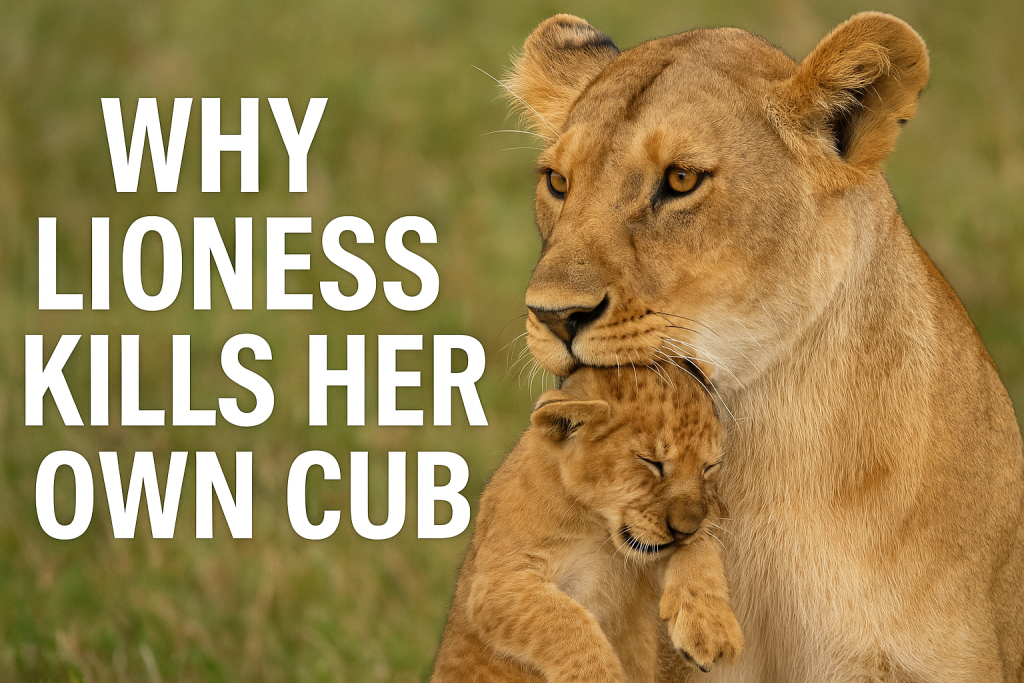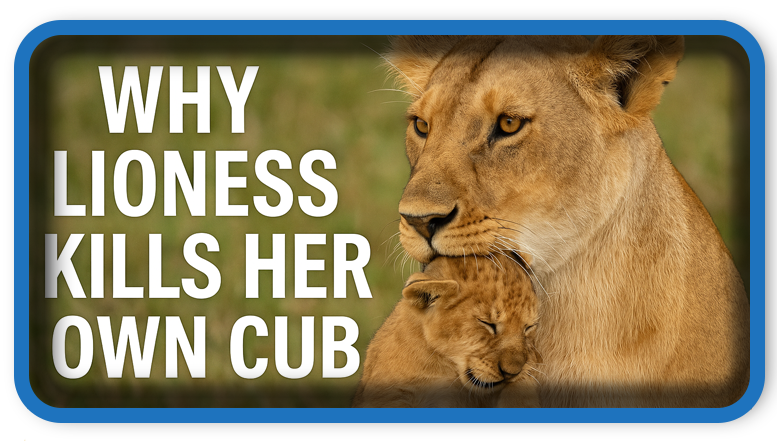⏲️ Estimated reading time: 6 min
Why Lioness Kills Her Own Cub. Although extremely rare and disturbing, a lioness biting her cub’s head off may stem from natural instincts. This post explores the reasons behind such shocking behavior and what it means in the context of survival, stress, and the animal kingdom.
Why Lioness Kills Her Own Cub – Shocking Animal Behavior Explained
Nature is beautiful, but at times, it is also brutally honest. One of the most shocking and heartbreaking scenes that can unfold in the animal kingdom is when a lioness attacks or even kills her own cub. Videos or reports of lionesses biting their cubs’ heads off often go viral, sparking horror, curiosity, and speculation. But as terrible as it may seem, this behavior is rooted in instinct and survival not malice.
In this article, we will explore the biological and psychological reasons behind this rare act and debunk the myth that lionesses are just being cruel.
1. Nature’s Harsh Rule: The Weak Do Not Survive
One of the core reasons a lioness might kill her cub is if the cub is sick, deformed, or too weak to survive in the wild.
Lions are predators that live in harsh conditions. A cub born with physical issues, infections, or signs of deformity may be seen as a threat to the survival of the pride. The lioness, acting on primal instincts, may eliminate the cub to:
- Prevent suffering.
- Focus her energy and milk on stronger cubs.
- Avoid attracting predators that target weak offspring.
This act of “selective infanticide” is seen across many species including rodents, primates, and even birds.
2. Stress and Environmental Pressure
Another cause of this shocking behavior is high stress, especially in unnatural or captive environments.
In the wild, lionesses are used to a natural rhythm hunting, mating, and raising cubs without interference. However, in zoos or reserves, things are different:
- Crowds, artificial lights, and noise can cause confusion and panic.
- Constant human surveillance may increase anxiety.
- Separation from the pride or lack of space may cause psychological distress.
When lionesses are anxious or disoriented, they may:
- Misidentify their cub.
- React defensively.
- Act aggressively without fully realizing what they are doing.
Stress-induced aggression is one of the primary explanations for infanticide in captivity.
3. First-Time or Inexperienced Mothers
Just like humans, not every lioness is naturally gifted at motherhood especially the first time around.
New lionesses might:
- Bite too hard while trying to lift a cub by the scruff.
- Step on the cub or roll over it by mistake.
- Become confused by the cub’s noises or behaviors and react aggressively.
If a cub is not feeding properly, is crying constantly, or seems ‘different’, a young mother may assume something is wrong and respond by attacking or rejecting it.
It’s tragic but underscores the reality that not all maternal instincts function perfectly in every case.
4. Male Takeovers – A Deadly Turn of Events
In lion prides, dominance and mating rights are everything. When a new male lion takes over a pride, his first act is often to kill all existing cubs.
Why? Because as long as a lioness is nursing cubs, she will not go into heat. By eliminating the cubs, the new male ensures that:
- The females return to estrus.
- He can sire his own offspring immediately.
Sometimes, lionesses are so aware of this fate that they may kill their own cubs to:
- Prevent prolonged suffering.
- Quickly move on and protect themselves.
This gruesome act is a biological adaptation, not a moral decision.
5. Food Scarcity or Famine Conditions
In extreme famine or starvation scenarios, a lioness may be forced into cannibalism.
Though rare, lions have been observed eating their own cubs when:
- There is no other food source.
- The pride is dying.
- Survival becomes the only priority.
In such moments, instinct overpowers emotion, and the lioness chooses to sustain herself to potentially reproduce again in the future.
6. Cannibalism in the Animal Kingdom
While it shocks humans, cannibalism is not unnatural among animals. Here are a few examples:
- Hamsters often eat their young when stressed.
- Chickens will peck at and kill weaker chicks.
- Fish may eat their own eggs or fry.
These acts aren’t personal. They are evolutionary strategies to maintain strong bloodlines and reduce strain on the mother.
Lionesses are normally very loving, gentle mothers raising, nursing, and fiercely protecting their young. When they turn violent, something abnormal has occurred.
7. Misinterpretation of What You Saw
Sometimes, it’s important to consider context:
- A lioness carrying her cub might be mistaken for biting.
- If the cub died naturally, the lioness might simply be trying to remove or eat the body (a clean-up behavior).
- Camera angles and viral clips often exaggerate or mislead.
Before drawing conclusions, scientists and zookeepers observe behavior patterns, body condition, and pride dynamics to understand the full picture.

8. Can This Be Prevented in Zoos?
Yes, partially. Zoos have learned to:
- Isolate new mothers from the crowd.
- Provide calm, dark, den-like environments.
- Limit handling and human exposure during the first weeks of birth.
- Monitor cub development and intervene if needed.
Still, nature cannot be fully tamed. Despite all efforts, instincts sometimes win.
9. Are There Similar Cases in Other Animals?
Absolutely. Here are some examples:
- Tigers have killed or abandoned cubs under stress.
- Primates like chimpanzees and baboons sometimes kill rival infants.
- Bears have been known to eat their cubs when starving.
These cases highlight how predatory animals prioritize survival and strength.
10. Should We Judge the Lioness?
As humans, we often see animals through a lens of emotion. But nature is governed by instinct, not morality.
A lioness biting her cub’s head off is not evil it’s:
- A response to disease or weakness.
- A reaction to stress or danger.
- A decision rooted in evolution, however grim.
Understanding this helps us respect the wild and acknowledge that not everything in nature is gentle but everything has a reason.
Final Thoughts
While rare and disturbing, a lioness killing her own cub reflects the complex balance of instinct, survival, and environmental factors. It reminds us that the wild no matter how majestic is a place of constant adaptation.
🔔For more tutorials like this, consider subscribing to our blog.
📩 Do you have questions or suggestions? Leave a comment or contact us!
🏷️ Tags: lioness kills cub, animal cannibalism, why animals eat their young, lion behavior, stress in animals, zoo animal stress, infanticide in animals, lion pride takeover, nature survival, animal instincts
📢 Hashtags: #LionessBehavior, #AnimalInstincts, #WildlifeFacts, #ZooPsychology, #CannibalismInAnimals, #NatureIsBrutal, #WhyLionsKillCubs, #LionPride, #SurvivalOfTheFittest, #AnimalKingdomTruths
🦁 Natural Instinct or Tragedy? What It All Means
In the untamed world of predators and prey, not everything is as peaceful as it seems. A lioness who turns on her cub is not a monster she’s an animal responding to an ancient code of survival. Understanding these rare events offers us a deeper insight into the unforgiving yet fascinating workings of nature.
Only logged-in users can submit reports.
Discover more from HelpZone
Subscribe to get the latest posts sent to your email.

